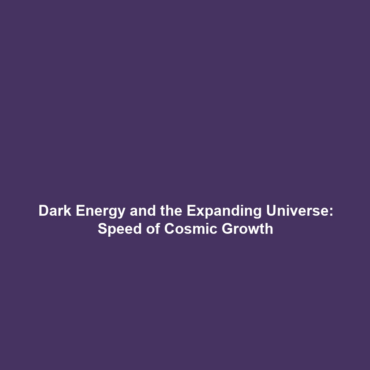“`
How Dark Energy Will Shape the Ultimate Fate of the Universe
Introduction
The mystery of dark energy represents one of the most significant challenges in modern cosmology, influencing our understanding of the universe’s ultimate fate. Dark energy, which makes up approximately 68% of the universe, is hypothesized to be responsible for the accelerated expansion observed in galaxies. Understanding how dark energy will shape the ultimate fate of the universe is crucial not only for theoretical physics but also for comprehending the very essence of celestial evolution. This article delves into the implications of dark energy within the broader context of dark matter and dark energy, highlighting its vital role in the cosmos.
Key Concepts
Dark energy is deeply intertwined with several key concepts in astrophysics, which include:
- The Cosmological Constant: Introduced by Albert Einstein, this concept posits a constant energy density throughout space, contributing to the universe’s expansion.
- Accelerated Expansion: Observations from distant supernovae indicate that the rate of expansion of the universe is increasing, a phenomenon attributed to dark energy.
- Dark Energy Density: Theoretical models suggest varying densities of dark energy may influence the fate of the universe, leading to scenarios such as the Big Rip or Heat Death.
Applications and Real-World Uses
Exploring how dark energy will shape the ultimate fate of the universe provides insights that extend beyond theoretical realms. Significant real-world applications include:
- Cosmological Models: Improved understanding of dark energy aids in the modeling of cosmic phenomena and contributes to astronomical predictions.
- Space Exploration: Insights from dark energy research inform future projects like the James Webb Space Telescope, which seeks to provide new observations of the universe.
The study of dark energy not only enhances our knowledge but also shapes technologies used in cosmological and astrophysical applications.
Current Challenges
Despite its significance, the challenges of studying how dark energy will shape the ultimate fate of the universe are manifold:
- Measurement Difficulties: Accurately determining the properties of dark energy remains a major hurdle due to its elusive nature.
- Theoretical Discrepancies: Different models of dark energy lead to various predictions, creating confusion in the scientific community.
- Lack of Consensus: There is ongoing debate regarding the fundamental nature of dark energy and its role in cosmic evolution.
Future Research and Innovations
Innovative research in dark energy is poised to unlock further mysteries of the universe. Key areas of focus include:
- Next-Gen Telescopes: Future advancements in telescopic technology will enhance our ability to measure the universe’s expansion with greater accuracy.
- Quantum Physics Applications: Researchers are investigating potential quantum effects that could provide new insights into dark energy.
These innovations not only promise to deepen our understanding of dark energy but also enhance our grasp of related fields such as dark matter.
Conclusion
In summary, understanding how dark energy will shape the ultimate fate of the universe is vital for advancing our knowledge within dark matter and dark energy frameworks. As research progresses, we can anticipate new revelations that will redefine our conception of the cosmos. For further reading on relevant topics, explore our articles on dark matter and cosmology.
“`
This document adheres to SEO optimization principles while providing a structured and informative article about dark energy and its implications in shaping the universe’s fate.

